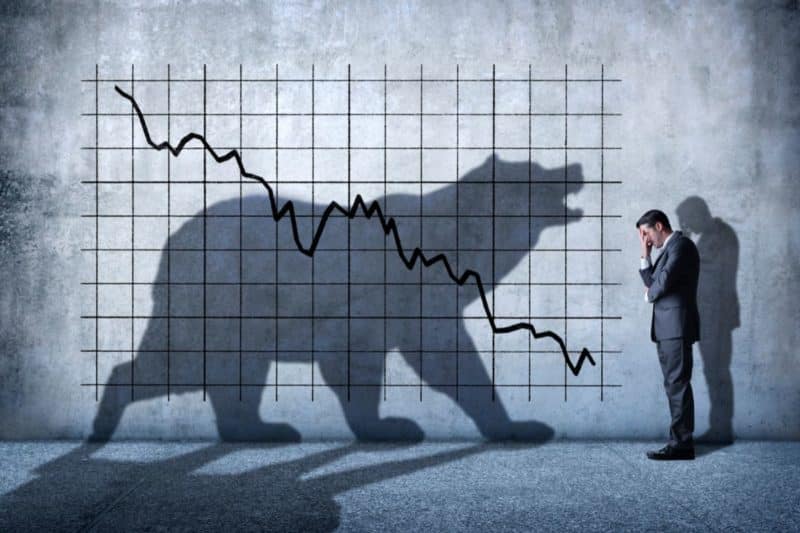Hopefully, the term ‘bear market’ is one that many homeowners and real estate experts fail to see very often. Yet as the US real estate market shifts and rebalances, that could have repercussions for homeowners as well as those who want to buy or sell.
The US economy is also worth paying attention to for those interested in the real estate market. As the stock market underperforms, inflation rises, and that can have an effect on interest rates which could all lead to a bear market.
But what is a bear market in real estate? While a bear market typically spells bad news for an economy, it could open up opportunities in the real estate sector.
In this guide, we will look at what a bear market means in real estate, how a bear market occurs in real estate, and the implications of a bear market.
What's Ahead...
What A Bear Market Means In Real Estate?
A bear market itself is when prices in a certain market drop by over 20%, typically the price of stocks from a recent high. Once a bear market occurs in real estate, you should see a significant drop in housing prices.
Though it rarely happens in the real estate market, you tend to see bear markets more often in the stock market.
This is largely because real estate prices tend to hold out a lot longer when compared to other asset classes, such as the stock market which can be more volatile.
One of the most recent bear markets for real estate happened between 2007 and 2009. As the housing bubble burst, the real estate market experienced tumbling house values.
The effect was that thousands of homeowners were led to foreclosure as a global recession took hold. When the market shifts, many homeowners, financial institutions, and real estate experts will be wary of a similar crash occurring again.
What Is A Bear Market In Real Estate?
While the stock market and the real estate market do intertwine, there is typically little correlation between the two. There are specific factors that affect each market independently yet as one drops, it can take the other market down with it.
For instance, during the housing crash between 2007 and 2009, a lot of the blame was directed at subprime lenders and their dubious lending practices.
In the fallout from the crash, regulations were put in place to prevent such a problematic situation from reoccurring. The unethical behavior of subprime lenders was one factor yet there are several others that can lead to a bear market in real estate.
One is a rise in mortgage rates, another is a reduced demand for housing relative to the supply. Finally, there is a more overarching economic uncertainty.
While many try to predict the future of the real estate market, it can prove difficult as it is usually a combination of factors that result in whether a bear market occurs or not.
The Implications Of A Bear Market
Once prices in a market begin to dip, that can encourage people to sell. This behavior is typically seen in the stock market when a significant decline prompts the selling of stocks which can soon spiral.
The stock market can fluctuate rapidly so a drop of 20% can be set by a benchmark and it can take a few months to return to that comparatively high position. As a bear market eases, a bull market can emerge where stock prices rise as their position has fallen so low.
Bear markets can signify that a recession is on the way but that does not have to be the case. Just as a bear market can be eased by a bull market when prices are low, a recession is typically seen as a natural element of the economic cycle as what goes up, must come down.
A bear market in the real estate market can lead to a recession, as seen between 2007 and 2009 when a crisis hit the subprime mortgage market.
House prices dropped and then spiraled downward in what was called a housing crash as homeowners owned more with their homes than what they were actually worth which led to foreclosure.
Final Thoughts
While a bear market in the stock market may have repercussions for the real estate market, a recession is a worst-case scenario. In fact, a bear market may be good news for anyone looking to invest in the real estate market as prices drop.
It is worth bearing in mind that certain sectors of the real estate market have their own behaviors and while one sector could see a fall in prices, that may not be the case for the entire market.
Though a recession spells bad news for most of the economy, there will always be a demand for housing and that could mean an ideal time to strike and shop for a bargain.
Frequently Asked Questions
What Is The Typical Length Of A Bear Market?
Thankfully, a bear market is normally short-lived as the prices that have dropped tend to pick themselves up. The typical length of a bear market is between nine and ten months with the average time of one being 289 days (9.6 months), according to Hartford Funds.
A bear market usually occurs every 3.6 years too. It is worth noting that the average 289 days of a bear market is a lot shorter than that of a bull market which has an average length of 991 days (2.7 years).
What Are The Triggers And Signs That A Bear Market Is Coming?
A bear market begins when prices begin to drop yet as one continues, they are usually triggered into action by investors’ collective pessimism and seemingly low confidence.
As the bear market becomes more evident, those investors can seem to let any good news pass them by and press on to sell quickly. Prices get pushed even lower as a result of that ignorance and continued pessimism.
Paul Martinez is the founder of BendingDestiny.com. He is an expert in the areas of finance, real estate, and eCommerce.
Join him on BendingDestiny.com to learn how to improve your financial life and excel in these areas. Before starting this blog, Paul built from scratch and managed two multi-million dollar companies. One in the real estate sector and one in the eCommerce sector.


